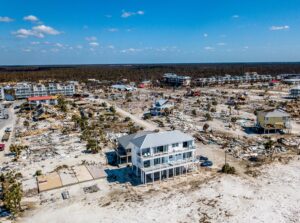Event Recap: Restarting Economies through Tourism: Vaccine politics, Global Priorities and Destination Realities with GRI Founding Director Stephen E. Flynn
On Wednesday, February 23rd, GRI’s Founding Director, Dr. Stephen Flynn, participated in a panel of experts to discuss issues facing the tourism sector due to the COVID-19 pandemic. The event, “Restarting Economies through Tourism: Vaccine Politics, Global Priorities and Destination Realities” was presented by the Global Tourism Resilience and Crisis Management Centre as part of the Edmund Bartlett Lecture Series.
Dr. Flynn began by defining resilience in the context of COVID-19: “A disaster is a terrible thing to waste,” he said. Fostering resilience is not about bouncing back but bouncing forward – it involves taking advantage, to some extent, of a crisis and leveraging the disaster to not only get societies back on their feet, but also safeguard prosperity for the longer term. This pandemic in particular has exposed longstanding social inequities and vulnerabilities that pervade society at large, and failing to address them systematically will bring our communities back to crisis mode – struggling even more – in future disasters.
One of these vulnerabilities, Dr. Flynn explained, is the increasing hyperconnectivity and interdependence our world relies on. These conditions made the COVID-19 pandemic distinctive from previous outbreaks, as it reinforced how vulnerable our intertwined international system is. “What used to be a local shock now cascades in far more destructive and costly ways than it did in the past,” Dr. Flynn said. As natural disasters and other unforeseen calamities become more frequent, our world becomes highly susceptible to cascading catastrophes where a local crisis can easily transcend from one system to others. Dr. Flynn presented the case of Hurricane Maria in Puerto Rico as a vivid illustration of the cascading dysfunction of modern lifelines where the electric power grid, water supply, communication, and distribution networks of medicine and other critical supplies simultaneously failed. Disasters in locations without redundancy can easily disrupt basic and higher-end services to a much greater extent, which is extremely disruptive in smaller, tourism-reliant economies, he explained.
Given the interdependence and vulnerability of our systems, Dr. Flynn presented five major barriers to achieving greater resilience as we overcome the COVID-19 pandemic: the first barrier is risk-literacy and the limited understanding of new dependencies. “I can’t ask you to become resilient against something you don’t think will happen,” he said. Blending efficiency and resilience is the second barrier – most systems are built to a certain threshold and become obsolete when there is a shock that exceeds that threshold. “Embedding resilience design into key systems would allow these networks to recover when they are under stress,” he said. The third and fourth barriers involve inadequate economic incentives for resilience measures and inadequate governance frameworks and policy guidance to foster resilience. Due to our interdependency, Dr. Flynn explained, not acting collaboratively becomes self-destructive: “There is no way the developed world protects itself if the developing world is left unprotected,” he said. Lastly, there is a lack of adequate interdisciplinary training and education programs to support comprehensive capabilities for advancing resilience. Dr. Flynn addressed the importance of leveraging the higher education community as partners in resilience efforts. “A cross-institutional network of researchers, academics, and students is necessary to advance both capacity and knowledge, but also to build the new workforce for tomorrow,” he said.
 Dr. Flynn concluded by explaining that resilience is ultimately both a competitive advantage and collaborative effort. People that have a choice will travel, live, and invest in resilient places, and avoid those that are not. But when achieved in isolation of the system around it, resilience becomes inefficient – it is futile to create an “island of resilience in a sea of fragility,” Dr. Flynn said while showing a picture of a house standing unscathed after a category five hurricane hit Mexico Beach, Florida in 2018. If we leave some people behind in this effort, we are only building inequity and growing disadvantage. In contrast, by adopting an interdisciplinary and collaborative approach among different sectors, we can understand how our systems work and how shocks will affect them, not only to mitigate disruption but to accelerate recovery and adaptation following a disaster. When crises occur, the responses are often driven by short-term priorities that leave behind systemic issues. “Coming out of this pandemic, recognizing the impact it has had, especially on tourism-reliant economies, we want to not only respond capably but go back to a better place,” states Dr. Flynn.
Dr. Flynn concluded by explaining that resilience is ultimately both a competitive advantage and collaborative effort. People that have a choice will travel, live, and invest in resilient places, and avoid those that are not. But when achieved in isolation of the system around it, resilience becomes inefficient – it is futile to create an “island of resilience in a sea of fragility,” Dr. Flynn said while showing a picture of a house standing unscathed after a category five hurricane hit Mexico Beach, Florida in 2018. If we leave some people behind in this effort, we are only building inequity and growing disadvantage. In contrast, by adopting an interdisciplinary and collaborative approach among different sectors, we can understand how our systems work and how shocks will affect them, not only to mitigate disruption but to accelerate recovery and adaptation following a disaster. When crises occur, the responses are often driven by short-term priorities that leave behind systemic issues. “Coming out of this pandemic, recognizing the impact it has had, especially on tourism-reliant economies, we want to not only respond capably but go back to a better place,” states Dr. Flynn.
